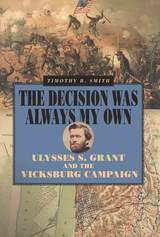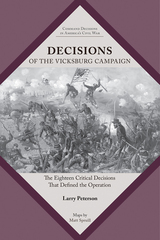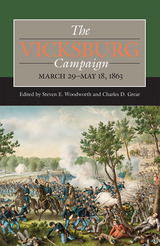
Showing how and why Grant became such a successful general, Smith presents a fast-paced reexamination of the commander and the campaign. His fresh analysis of Grant’s decision-making process during the Vicksburg maneuvers, battles, and siege details the course of campaigning on military, political, administrative, and personal levels. The narrative is organized around Grant’s eight key decisions: to begin operations against Vicksburg, to place himself in personal charge of the campaign, to begin active operations around the city, to sweep toward Vicksburg from the south, to march east of Vicksburg and cut the railroad before attacking, to assault Vicksburg twice in an attempt to end the campaign quickly, to lay siege after the assaults had failed, and to parole the surrendered Confederate garrison rather than send the Southern soldiers to prison camps.
The successful military campaign also required Grant to master political efforts, including handling Lincoln’s impatience and dealing with the troublesome political general John A. McClernand. Further, he had to juggle administrative work with military decision making. Grant was more than a military genius, however; he was also a husband and a father, and Smith shows how Grant’s family was a part of everything he did.
Grant’s nontraditional choices went against the accepted theories of war, supply, and operations as well as against the chief thinkers of the day, such as Henry Halleck, Grant’s superior. Yet Grant pulled off the victory in compelling fashion. In the first in-depth examination in decades, Smith shows how Grant’s decisions created and won the Civil War’s most brilliant, complex, decisive, and lengthy campaign.

Decisions of the Vicksburg Campaign explores the critical decisions made by Confederate and Federal commanders during the battle and how these decisions shaped its outcome. Rather than offering a history of the battle, Larry Peterson hones in on a sequence of critical decisions made by commanders on both sides of the contest to provide a blueprint of the battles for Vicksburg at their tactical core. Identifying and exploring the critical decisions in this way allows students of the battles to progress from a knowledge of what happened to a mature grasp of why events unfolded as they did.
Complete with maps and a driving tour, Decisions of the Vicksburg Campaign is an indispensable primer, and readers looking for a concise introduction to the battle can tour this sacred ground—or read about it at their leisure—with key insights into the campaign and a deeper understanding of the Civil War itself. Decisions of the Vicksburg Campaign is the twentieth in a series of books that will explore the critical decisions of major campaigns and battles of the Civil War.

Ulysses S. Grant’s ingenious campaign to capture the last Confederate stronghold on the Mississippi River was one of the most decisive events of the Civil War and one of the most storied military expeditions in American history. The ultimate victory at Vicksburg effectively cut the Confederacy in two, gave control of the river to Union forces, and delivered a devastating blow from which the South never fully recovered. Editors Steven E. Woodworth and Charles D. Grear have assembled essays by prominent and emerging scholars, who contribute astute analysis of this famous campaign’s most crucial elements and colorful personalities.
Encompassed in this first of five planned volumes on the Vicksburg campaign are examinations of the pivotal events that comprised the campaign’s maneuver stage, from March to May of 1863. The collection sheds new light on Grant’s formidable intelligence network of former slaves, Mississippi loyalists, and Union spies; his now legendary operations to deceive and confuse his Confederate counterparts; and his maneuvers from the perspective of classic warfare. Also presented are insightful accounts of Grant’s contentious relationship with John A. McClernand during the campaign; interactions between hostile Confederate civilians and Union army troops; and the planning behind such battles as Grierson’s Raid, Port Gibson, Raymond, Jackson, Champion Hill, and Big Black River Bridge.
READERS
Browse our collection.
PUBLISHERS
See BiblioVault's publisher services.
STUDENT SERVICES
Files for college accessibility offices.
UChicago Accessibility Resources
home | accessibility | search | about | contact us
BiblioVault ® 2001 - 2024
The University of Chicago Press









